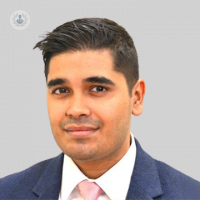An expert's guide to nasal polyps
Written by:Nasal polyps are a common condition that have a number of different possible causes. In his latest online article Mr Kiran Varad explains these causes, the symptoms and treatment of polyps.

What are nasal polyps? What causes them?
Nasal polyps are benign non-cancerous growths that occur in the nose or sinuses. They are caused by chronic inflammation. They often develop due to allergies, asthma, recurrent infections, or immune disorders. Genetic factors and exposure to irritants like dust or pollutants may also contribute. Nasal polyps are more common in adults, particularly those over 40.
What are the most common symptoms of nasal polyps?
The most common symptoms include nasal blockage, a runny nose/post-nasal drip, loss of sense of smell and pain and pressure around the face.
Can nasal polyps be a sign of something serious?
In most cases, nasal polyps are non-cancerous and not a sign of something serious. However, they can be associated with underlying conditions or contribute to certain health issues. This includes asthma and aspirin sensitivity. Rarely, polyps can be pre-cancerous or cancerous, these tend to occur on one side of the nose only. It's important to consult with a healthcare professional for an accurate diagnosis and appropriate management.
When is treatment required for nasal polyps?
Treatment for nasal polyps is typically required in the following cases:
- Persistent symptoms affecting daily life.
- Inadequate response to conservative measures such as nasal steroids and saline rinses.
- Complications such as recurring sinus infections.
What does nasal polyp surgery entail?
Surgery for nasal polyps is usually undertaken under general anaesthesia. The procedure is referred to as a nasal polypectomy and functional endoscopic sinus surgery. It is a safe procedure that is done as a day case.
The operation is undertaken via a minimally invasive approach through the nostril with a small endoscope (camera) and fine surgical instruments. Polyps are removed and sinus drainage pathways are opened. Occasionally absorbable packing is placed in the nose after the procedure.
The recovery period is 1-2 weeks and I advise patients to plan time of work and avoid strenuous exercise.
Common risks include nose bleeds, infection and pain. Recurrence of polyps can occur (this risk is higher in patients with asthma and aspirin sensitivity). Some individuals may experience temporary or permanent changes in their sense of smell following surgery. Rarely, there is a risk of damaging surrounding structures (including the eye and causing a leak of the fluid cushioning the brain that may require repair at the same time of surgery or later).
Mr Kiran Varad is a renowned consultant paediatric and general ENT surgeon who is based in London and Surrey. If you would like to book a consultation with Mr Varad, you can do so today via his Top Doctors profile.


